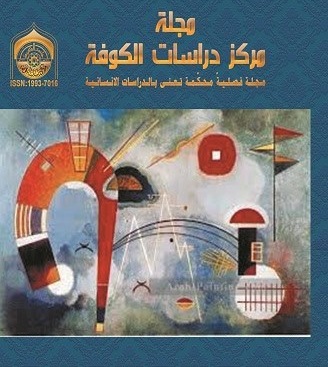أسس شرعية النظام الدستوري في العراق
DOI:
https://doi.org/10.36322/jksc.v1i60.71Keywords:
لا يوجدAbstract
Within the framework of society, we note that it always appears a group of individuals whose will is imposed on the majority, whether by acceptance or against their will, where they direct their orders to the group, and these individuals are (rulers), and the rest of the group members who receive and execute orders are (the governed), and that all A society in which there must be a ruling class and another governed, and this class differentiation is considered one of the natural social phenomena that characterize human societies alike.
The ruling class is in fact the authority, and therefore authority in its essence is considered a natural phenomenon, as it is not possible to conceive of a society without authority, whether this power is spiritual or material, therefore the authority, (a perception of a person to interpret and understand the orders of rulers), therefore, The relationship between the rulers and the ruled is not just a material relationship free from characterization and ideological justification as a relationship between the strong and the weak and according to them, it always needs the individual - the ruled - to justify submissiveness, and that the one who orders - the ruler - justifies his orders. Indeed, the position on authority and the justification for its exercise and submission to it determine the individual's position on its legitimacy.
Legitimacy here is based on obedience to authority and abiding by its orders, so if individuals believe in the legitimacy of authority in terms of its formation and exercise, then their obedience to it will be absolute and power at the same time will be strong and ruling in its grip, and on the contrary, if the authority lost its legitimacy by losing the faith of individuals In the way it is formed or practiced, it loses its power and control over society. Perhaps the crisis of legitimacy in its reality is the crisis of authority in society and the crisis of exercising this authority, and the latter expresses itself with the legal rules that it sets. Therefore, the crisis of legitimacy leads to a crisis of law established by the authority.
The authority in which individuals do not know the extent of their stability and there is no recognition within them that their legislative actions will be destabilizing, and in this case in the community there will be empty laws that the citizen does not respect because they are issued by an authority that does not believe in them and doubts their legitimacy, as individuals obey the law established by legitimate authority, and obedience Law is in a sense conferring legitimacy on the authority that places it.
Accordingly, the legal rules are not obedient and taken for granted if issued by an authority that loses legitimacy, and if it is issued in this case, the barrier between permissible and permissible and between permissible and unlawful will fall and this is corruption itself, as society views the authority with illegitimacy and Everything that comes out of it is illegal and worthy of disrespect and obedience, and here the crisis of legitimacy of power emerges as it is.
The legitimacy of any authority has an objective and another formal aspect, and in order for it to be realized, both sides must be available. If one of them fails to succeed, the authority loses its legitimacy. We may imagine the formation of an authority in the ways and mechanisms provided for by the legislation, and thus be a guardian of formal legitimacy, but this authority may lose its legitimacy through the illegal practices that it undertakes and which contradict the spirit of the constitution and its basic principles that may not be violated at all, where it is lost Its objective legitimacy, and here emerges the crisis (between text and practice), and by analogy with these ideas, how was the constitutional system in Iraq after 2003, in terms of text and practice
Downloads
Downloads
Published
How to Cite
Issue
Section
License
Copyright (c) 2022 Kufa Studies Center Journal

This work is licensed under a Creative Commons Attribution 4.0 International License.
Permit others to distribute and copy the manuscript, to create extracts, abstracts, and other revised versions, adaptations, or derivative works of or from the manuscript (such as a translation), to include in a collective work, to text or data mine the article, even for commercial purposes, as long as they credit the author(s), do not represent the author as endorsing their adaptation of the article, and do not modify the article in such a way as to damage the author''''s honor or reputation. Further details are found at Creative Commons Attribution 4.0 International (CC BY 4.0)






























